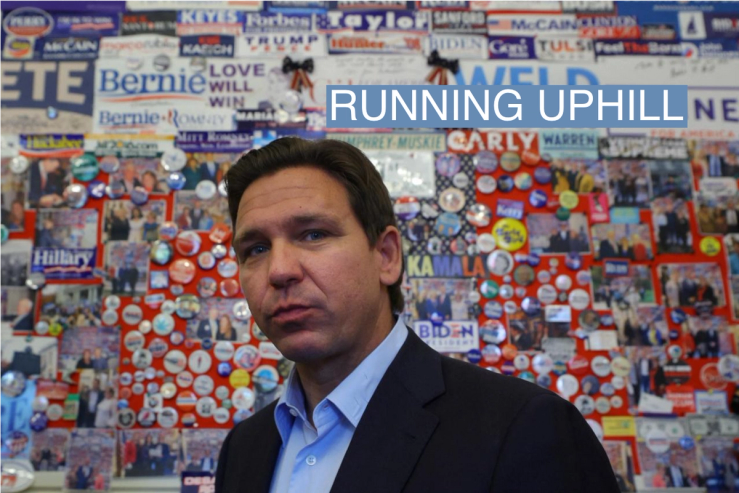The News
Donald Trump and Joe Biden seem to be increasingly focused on the general election, with allies on both sides viewing a rematch as near-inevitable. State and national polling shows Trump with a massive, growing lead in primaries while his opponents carve up a smaller share of votes. And anti-Trump Republican groups are finding in polls and focus groups that a long list of attacks against the frontrunner just aren’t landing — in some cases, they even increase his support — prompting some to give up.
Add it all up and you might ask why Trump’s opponents even bother staying in the race.
So we asked them: In conversations with candidates, campaign officials, and outside backers, non-Trump Republicans described a few shreds of hope that are keeping them going for now.
For one, campaigns still see another phase to the race, one in which a single candidate consolidates support and starts looking like a final rival to Trump and forces voters to pay more attention. Mitt Romney, who has expressed skepticism that Trump can be defeated, urged donors and campaigns at a retreat this week to winnow the field as fast as possible to preserve whatever chance of avoiding a “train wreck” remains.
Nikki Haley’s team cited her rise towards second place in some polls as crucial momentum, and noted that one of the earliest dropouts in the race (Will Hurd) had endorsed her. A Haley advisor also argued that she’s running “a unique campaign that carves out a lane unlike any other candidate” — and that some surveys show her outperforming the field against Biden, including a Fox News poll just this week.
For Ron DeSantis’ team, it’s all about Iowa: His campaign believes Trump is in trouble in the key early state, despite his strong recent polling, and that their operations and new ad blitz there will prove to be the key as voters make up their mind closer to the actual caucus date. In recent weeks, DeSantis has also upped his attacks against Trump on a variety of topics, including decrying his recent criticism of Israel’s government after the terrorist rampage by Hamas. The campaign has argued that the direct approach, which comes after months of more circumspect criticism from both him and other candidates, might yield dividends with voters.
Chris Christie, meanwhile, is all in on New Hampshire, where an advisor told Semafor that he sees a pool of independent and non-affiliated voters who could help counter Trump’s hold on the Republican base. One national PAC is working to convince Democrats to cross over just for the primary in order to oppose Trump, which could provide an additional source of votes. It doesn’t hurt that Robert F. Kennedy Jr. just abandoned his challenge to Biden to run as an independent instead.
“When you don’t have a competitive Democratic presidential primary, especially this year, you could see a lot of independent voters really eager to participate and to get out there vote, and there’s only one show in town when it comes to that, right?” the Christie advisor said.
And then there’s Mike Pence and Tim Scott: Advisors for both campaigns argued that their candidates are the most conservative on the issues — something that, in theory at least, should help them in a match up against Trump, who historically has been all over the map with his political beliefs. Both candidates also bring their own set of experiences to the table: Pence, as a former vice president, and Scott, who an advisor described as the most likable candidate in the race. As a senator, he’s also currently trying to highlight his role as the lone candidate in a position to help enact policies in response to the recent war in Israel.
There’s also the ever-present hope that Trump will eventually “collapse under his own weight,” as the cliché goes, even as his many indictments, trials, and lawsuits have so far only rallied Republicans to his defense.
“I’m not sure there’s ever been somebody that far in front who’s had as many hurdles in front of them that Donald Trump has,” Pence advisor Marc Short told Semafor after the second Republican debate.
And finally, there’s always room for a little blind faith. Campaigns are holding out for the possibility that some major event changes the race — perhaps one none of them can predict — and they want to be in the best position possible to capitalize should it arrive.
“Control the controllables,” Kathy Barnette, Vivek Ramaswamy’s grassroots director, told Semafor after the last debate. “What can we control? Be very clear, very sustained.”
In this article:
Shelby’s view
There are certainly glimmers of hope and some time to go until the Republican primary wraps up. But the campaign’s arguments also represent the last remaining ones that they have to lean on — previous predictions that debates, or improved name recognition, or indictments, or abortion politics, or a post-Labor Day surge of attention, or any of a number of factors, would change the race have all been discredited so far.
Electability arguments, already a questionable approach, have lost much of their punch as Democrats publicly and privately worry about polls showing Trump tied or even leading Biden in a general election. None of the Republican candidates have figured out a magic formula to either break away from the crowded field or drag down Trump’s numbers. And the ones with the most pointed critiques of Trump have often fared the worst overall.
“The overwhelming truth of the Republican Party is that Trump is popular because the Republican Party likes Trump,” Stuart Stevens, a former GOP strategist, told my colleague Dave Weigel. “If you look at Asa Hutchinson and Chris Christie, both former clients of mine by the way, what are they going to get in this primary? Ten percent, when it’s all said and done?”
It’s also becoming harder and harder to keep attention on the primary campaign as the contest looks more sewn up and news events like the House speaker’s race and Israel’s response to Hamas overtake coverage. A massive Trump lead can become a self-fulfilling prophecy if it causes voters to further tune out the alternatives.
This point of view — that no single campaign has proven they have the ability to become a serious contender against Trump — is beginning to seep into outside Republican groups and strategists who have spent months trying to take down the former president in the primary.
Win It Back PAC president David McIntosh, whose recent memo describing the complete failure of the group’s “traditional” attacks on Trump was widely covered, insisted that their research still showed some potential in messages that touched on “Trump fatigue” and his ability to win a general election — especially unscripted testimonials from ordinary voters.
“The data shows we can and did move the needle,” McIntosh said in a statement.
Another group that’s been running ads against Trump, AFP Action, said they still saw opportunities to influence the race. [Note: AFP Action responded to Semafor’s comment request after publication.]
“We continue to see that Trump’s support is extremely soft, with more than two-thirds of his current supporters fully acknowledging they’re open to an alternative candidate,” AFP Action spokesperson Bill Riggs said. “Trump’s ability to beat Biden and the baggage he brings to the race are top concerns. Republican voters are ready to turn the page and nominate a new leader — they just need to see someone break from the field and show they can win.”
But another group, the Republican Accountability Project, ran ads featuring rank-and-file conservatives discussing virtually identical themes that were derived from similar polling and focus group research — and eventually decided they were a waste of time.
“We were spending money in Iowa, we had a campaign running, we found lots of two-time Trump voters who were talking about why they didn’t want Trump to be the nominee,” Sarah Longwell, executive director of the Republican Accountability Project, told me. “We pulled out, because I didn’t see any other candidate who not only looked like they could beat Trump, but looked like they were really trying. I don’t see a path, unless someone’s really willing to break out and start running an aggressive campaign against Trump and for themselves.”
And therein lies another hurdle for Trump’s opponents to overcome: The reality that even those rooting for them are beginning to think they should save their ammo for the Trump-Biden general election battle — whichever side of it they intend to be on.
Room for Disagreement
There’s always the hope a white knight will ride to the rescue. Some donors are pitching Virginia Gov. Glenn Youngkin as a potential savior who could reshuffle the race with a late entry, despite limited name recognition and little polling evidence that Republicans are clamoring for his candidacy.
Notable
Trump may have provided an opening to rivals after remarks in which he criticized Israeli Prime Minister Benjamin Netanyahu and described Hezbollah as “very smart” just days after the country faced a deadly attack: Rivals like DeSantis, Pence, and Scott quickly called out the former president, as did the White House.


